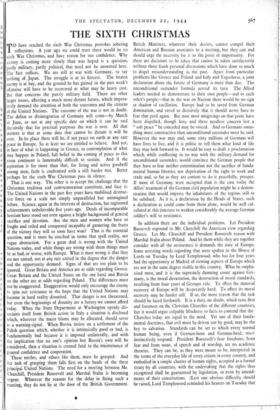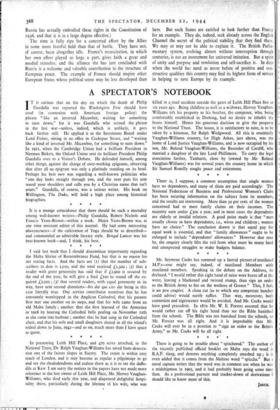THE SIXTH CHRISTMAS
T0 have reached the sixth War Christmas provokes sobering reflections. A year ago we could trust there would be no sixth War Christmas, and have reason for our confidence. Why victory is coming more slowly than was hoped is a question, partly military, partly political, that need not be answered here. The fact suffices. We are still at war with Germany, to say nothing of ,Japan. The struggle is at its fiercest. The beaten enemy is at bay, and the ground he has gained in the past week's offensive will have to be recovered at what may be heavy cost. But that concerns the purely military field. There are other larger issues, affecting a much more distant future, which impera- tively demand the attention of both the statesmen and the citizens of the United Nations. The outcome of the war is not in doubt. The defeat or disintegration of Germany will come—by March or June, or not at any specific date on which it can be said decisively that for practical purposes the war is over. All that matters is that at some date that cannot be distant it will be over. In its place there will be, if not peace on earth at any rate peace in Europe. Sp at least we are entitled to believe. And yet, in face of what is happening in Greece, in contemplation of what may happen in Poland, full belief in the coming of peace to this riven continent is lamentably difficult to sustain. And if the aspiration is for more than that, for living and active goodwill among men, faith is confronted with a still harder test. Better perhaps let the sixth War Christmas pass in silence. That is one way. The other is to accept the challenge that the Christmas tradition and commemoration constitute, and face it. The United Nations in the past five years have mobilised destruc- tive force on a scale not simply unparalleled but unimagined before. Science, again in the interests of destruction, has registered achievements unbelievable five years ago. Deeds of incomparable heroism have stood out even against a bright background of general sacrifice and devotion. Are the men and women who have so fought and toiled and conquered incapable of garnering the fruits of the victory they will so soon have won? That is the essential question, and it must be couched in terms that spell reality, not vague abstraction. For a great deal is wrong with the United Nations today, and while things are wrong with them things must be as bad, or worse, with Europe. What is most wrong is that they are not united, not at any rate united in the degree that the danger and the opportunity demand. Signs of that are too plain to be ignored. Great Britain and America are at odds regarding Greece. Great Britain and the United States on the one hand and Russia on the other are at odds regarding Poland. The differences must not be exaggerated. Exaggeration would only encourage the enemy to spin out resistance in the hope that the United Nations may become in hard reality disunited. That danger is not threatened, but even the beginnings of disunity are a luxury we cannot afford today. When the State Department at Washington openly dis- sociates itself from British action in Italy a situation is disclosed which, wherever the major blame may be allocated, should serve as a warning-signal. When Russia insists on a settlement of the Polish question which, whether it is intrinsically good or bad, is fundamentally bad because it is imposed unilaterally, and with the implication that no one's opinion but Russia's own will be considered, then a situation is created fatal to the maintenance of general confidence and cooperation.
These nettles, and others like them, must be grasped. And the task of grasping them falls first on the heads of the three principal United Nations. The need for a meeting between Mr. Churchill, President Roosevelt and Marshal Stalin is becoming urgent. Whatever the reasons for the delay in fixing such a meeting, they do not lie at the door of the British Government. British Ministers, whatever their desires, cannot compel their American and Russian associates to a meeting,, but they can and should urge the necessity for it to the point of importunity. For there are decisions to be taken that cannot be taken satisfactorily without those frank personal discussions which have done so much to dispel misunderstanding in the past. Apart from particular problems like Greece and Poland and Italy and Yugoslavia, a joint declaration about the future of Germany is more than due. The unconditional surrender formula served its turn. The Allied leaders needed to demonstrate to their own people—and to each other's people—that in the war on Nazism there would be no sign or shadow of vacillation. Europe had to be saved from German dominafion, and saved so decisively that it should never have to fear that peril again. But now most misgivings on that point have been dispelled, though here and there needless concern lest a " soft peace " be conceded may be voiced. And to Germans some- thing more constructive than unconditional surrender must be said. However the war may end, some sixty millions of Germans will have lives to live, and it is politic to tell them what kind of life they may look forward to. It would be easy to draft a proclamation which, while conflicting in no way with the military demand for unconditional surrender, would convince the German people that they have to fear neither extermination nor the sacrifice of funda- mental human liberties nor deprivation of the right to work and trade and, so far as they are content to do it peacefully, prosper. If more of Germany were occupied than is the case today the Allies' treatment of the German civil population might be a demon- stration that would impress the inhabitants of the regions still to be subdued. As it is, a declaration by the Heads of States, such a declaration as could come from them alone, would be well cal- culated at this juncture to weaken considerably the average German soldier's will to resistance.
In addition there are the individual problems. Let President Roosevelt expound to Mr. Churchill the American view regarding Greece. Let Mr. Churchill and President Roosevelt reason with Marshal Stalin about Poland. And let them while they are together consider with all the seriousness it demands the state of Europe. Some arresting words regarding that were spoken in the House of Lords on Tuesday by Lord Templewood, who has for four years had the opportunity at Madrid of viewing aspects of Europe which are not in the same degree visible in this country. What he empha- sised most; and it is the supremely damning count against Ger- many, is the moral devastation, the destruction of moral standards, resulting from four years of Gestapo rule. To effect the material recovery of Europe will be desperately hard. To effect its moral recovery may be harder still. If so, the more reason that the task should be faced forthwith. It is a duty, no doubt, which rests first and foremost on the Christian Churches of the different countries, but it would argue culpable blindness to facts to contend that the Churches today are equal to the need. Yet one of their funda- mental doctrines, that evil must be driven out by good, may be the key to salvation. Standards can be set to which every normal human being, even if German-born and German-bred, must instinctively respond. President Roosevelt's four freedoms, from fear and from want, of speech and of worship, are no academic theories. They can be, as they were meant to be, interpreted in the terms of the everyday life of every citizen in every country, and embodied in a simple charter of human rights, accepted as a formal treaty by all countries, with the undertaking that the rights thus recognised shall be guaranteed by legislation, or even by amend- ments of their constitutions. (Lest one obvious difficulty should be raised, Lord Templewood reminded his hearers on Tuesday that Russia has actually embodied these rights in the Constitution of 1936, and that it is in a large degree effective.) The time is fully ripe for a concerted effort by the Allies in some more fruitful field than that of battle. They have not, of course, been altogether idle. France's resuscitation, in which her own effort played so large a part, gives faith a great and needed stimulus, and the alliance she has just concluded with Russia is a welcome and valuable contribution to the structure of European peace. The example of France should inspire other European States whose political sense may be less developed than hers. But such States are entitled to look farther than France for an example. They do, indeed, seek already across the English Channel the secret of the political stability that they find there. We may or may not be able to explain, it. The British Parlia- mentary system, evolving almost without interruption through centuries, is not an instrument for universal imitation. But a spirit of unity and purpose and resolution and self-sacrifice is. In days when the world has need as never before of positive and con- structive qualities this country may find its highest form of service in helping to save Europe by its example.



























 Previous page
Previous page